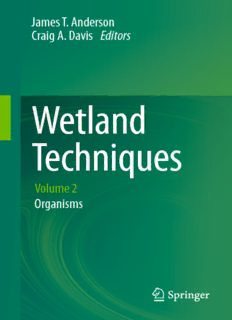
James T. Anderson Craig A. Davis Editors Volume 2 Organisms PDF
Preview James T. Anderson Craig A. Davis Editors Volume 2 Organisms
James T. Anderson Craig A. Davis Editors Wetland Techniques Volume 2 Organisms Wetland Techniques James T. Anderson (cid:129) Craig A. Davis Editors Wetland Techniques Volume 2: Organisms Editors JamesT.Anderson CraigA.Davis ForestryandNaturalResources DepartmentofNaturalResourceEcology andEnvironmentalResearchCenter andManagement WestVirginiaUniversity OklahomaStateUniversity Morgantown,WV,USA Stillwater,OK,USA ISBN978-94-007-6930-4 ISBN978-94-007-6931-1(eBook) DOI10.1007/978-94-007-6931-1 SpringerDordrechtHeidelbergNewYorkLondon LibraryofCongressControlNumber:2013950172 ©SpringerScience+BusinessMediaDordrecht2013 Chapter7:©SpringerScience+BusinessMediaDordrecht(outsidetheUSA)2013 Thisworkissubjecttocopyright.AllrightsarereservedbythePublisher,whetherthewholeorpart of the material is concerned, specifically the rights of translation, reprinting, reuse of illustrations, recitation,broadcasting,reproductiononmicrofilmsorinanyotherphysicalway,andtransmissionor informationstorageandretrieval,electronicadaptation,computersoftware,orbysimilarordissimilar methodologynowknownorhereafterdeveloped.Exemptedfromthislegalreservationarebriefexcerpts inconnectionwithreviewsorscholarlyanalysisormaterialsuppliedspecificallyforthepurposeofbeing enteredandexecutedonacomputersystem,forexclusiveusebythepurchaserofthework.Duplication ofthispublicationorpartsthereofispermittedonlyundertheprovisionsoftheCopyrightLawofthe Publisher’s location, in its current version, and permission for use must always be obtained from Springer.PermissionsforusemaybeobtainedthroughRightsLinkattheCopyrightClearanceCenter. ViolationsareliabletoprosecutionundertherespectiveCopyrightLaw. The use of general descriptive names, registered names, trademarks, service marks, etc. in this publicationdoesnotimply,evenintheabsenceofaspecificstatement,thatsuchnamesareexempt fromtherelevantprotectivelawsandregulationsandthereforefreeforgeneraluse. While the advice and information in this book are believed to be true and accurate at the date of publication,neithertheauthorsnortheeditorsnorthepublishercanacceptanylegalresponsibilityfor anyerrorsoromissionsthatmaybemade.Thepublishermakesnowarranty,expressorimplied,with respecttothematerialcontainedherein. Printedonacid-freepaper SpringerispartofSpringerScience+BusinessMedia(www.springer.com) Preface Wetlands are generically defined as lentic systems that take on characteristics of bothterrestrialandaquaticsystemswherevegetationcapableofgrowinginshallow water proliferates.However,there are manydefinitionsofwetlands inuse around the world, including a number that have ecological and legal significance. Even among these definitions, there are numerous subtle nuances that blur the lines between wetlands and either terrestrial or aquatic systems. Despite the confusion and oftentimes contradictory nature of wetland definitions, wetlands are increas- ingly being recognized as critical ecosystems throughout the world. In particular, weareseeinganincreasedawarenessaboutthevaluesandbenefitsderivedfromthe world’swetlands.Asthisawarenesshasgrown,wehavealsoseenagreaterfocus on efforts to better manage, conserve, and protect wetlands. Wetland-related researchhasbeenandwillcontinuetobecriticallyimportantinprovidingguidance toalltheeffortstobettermanage,conserve,andprotectwetlands.Infact,thereisa plethoraofwetland-relatedliteratureavailabletowetlandscientists,regulators,and managers, many of which can be found in at least two journals that are dedicated exclusively to wetlands. However, for most wetland professionals, it may be a dauntingtasktoaccessmuchofthisliterature.Additionally,wetlandprofessionals have not had a book available that covers techniques associated with wetland research,management,andregulation. The lack of such a book has been a major void in the wetland field. In fact, wetlandprofessionalshavediscussedforsometimetheneedforabookthatfocused onwetlandresearchandmanagementtechniques.Webelievethedevelopmentofa techniquesbookforaprofessionisasignthattheprofession, inthiscasewetland science,ismaturing.Scientificprogressinafieldisoftenadvancedbythedevelop- mentofatechniquesbookbecausealmostallstudiesandmanagementactionsboil down to choosing appropriate techniques, and a book focused on the topic of wetland techniques will provide fledgling scientists and managers a solid founda- tion for initiating research and management efforts. We have designed this three volume set for students and professionals interested in wetlands ecology, v vi Preface management, and creation. We are pleased to be a part of the development and progression of our discipline through our involvement with the development of WetlandTechniquesVolume1:Foundations,Volume2:Organisms,andVolume3: ApplicationsandManagement. WestVirginiaUniversity JamesT.Anderson Morgantown,WV,USA OklahomaStateUniversity CraigA.Davis Stillwater,OK,USA Acknowledgments Wetland Techniques is our first attempt at a major book project and it was a wonderful learning opportunity as well as an eye-opening experience in regards toalltheeffortthatgoesintocreatingaseriesofbooksofthismagnitude.Wehave new-found admiration for all those before us that have successfully tackled book projectsforthebenefitofscience. Wethankthechapterauthorsforprovidingfreelyoftheirtimeandexpertise.It hasbeenapleasureworkingwiththeauthorsandwehavelearnedalotmoreabout wetlandsbecauseofthem.Wethankallofthechapterrefereesforgivingtheirtime and expertise to improve the quality of this three volume Wetland Techniques set through constructive reviews that greatly improved the chapters. We especially thankRachelHager,undergraduatestudentinWildlifeandFisheriesResourcesat West VirginiaUniversity,for allofher helpinformattingandverifying literature citationsandperformingnumerousothertaskstoimprovethebook.Wealsothank Roseanne Kuzmic, research associate in the Natural Resource Ecology and Man- agement Department at Oklahoma State University, for assistance with verifying literaturecitations. Thefollowingindividualslenttheirtimeandexpertisetoimprovingthesethree volumesbyservingasexpertreviewersandcommentingononeormorechapters: Andrew Burgess, Ann Anderson, John Brooks, Crissa Cooey, Diane DeSteven, Adam Duerr, Walter G. Duffy, Andy Dzialowski, Gordon Goldsborough, Mark Gregory, Kim Haag, Patricia Heglund, Wade Hurt, Paul Koenig, James W. LaBaugh, Ted LaGrange, Richard L. Naff, Chris Noble, Aaron Pearse, James Rentch, Wayne Rosing, Stephen Selego, Ken Sheehan, Lora Smith, Gabe Strain, JeredStudinski,CharlesH.Theiling,WalterVeselka,SusanWalls,LisaWebb,and NicolasZegre. vii Contents 1 MethodsforSamplingandAnalyzingWetlandAlgae. . . . . . . . . . 1 StevenN.Francoeur,StevenT.Rier,andSarahB.Whorley 2 MethodsforSamplingandAnalyzingWetlandSoil BacterialCommunity. . . . . . . . . . . . . . . . . . . . . . . . . . . . . . . . . . 59 AixinHouandHenryN.Williams 3 MethodsforSamplingandAnalyzingWetlandFungi. . . . . . . . . . 93 StevenL.Stephenson,ClementTsui,andAdamW.Rollins 4 MethodsforSamplingandAnalyzingWetland Protozoa(Protists). . . . . . . . . . . . . . . . . . . . . . . . . . . . . . . . . . . . 123 MarianneBorneff-LippandMatthiasDuerr 5 SamplingandProcessingAquaticandTerrestrial InvertebratesinWetlands. . . . . . . . . . . . . . . . . . . . . . . . . . . . . . . 143 JamesT.Anderson,FlorenciaL.Zilli,LucianaMontalto, MercedesR.Marchese,MatthewMcKinney,andYong-LakPark 6 WetlandFishMonitoringandAssessment. . . . . . . . . . . . . . . . . . 197 MichaelD.Kaller,WilliamE.Kelso,andJoelC.Trexler 7 WetlandWildlifeMonitoringandAssessment. . . . . . . . . . . . . . . 265 MatthewJ.Gray,MichaelJ.Chamberlain,DavidA.Buehler, andWilliamB.Sutton Index. . . . . . . . . . . . . . . . . . . . . . . . . . . . . . . . . . . . . . . . . . . . . . . . . 319 ix
Description: